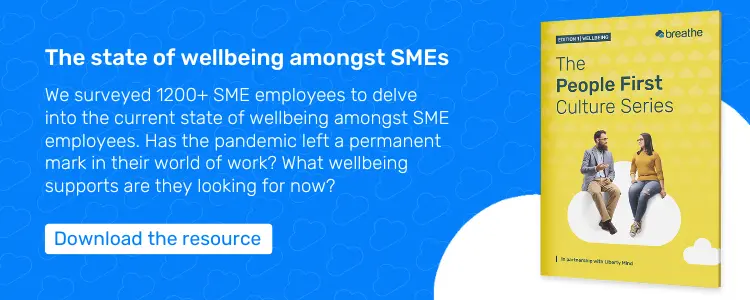The challenges faced by HR professionals are nearly endless; and yet HR teams continue to be there for employees, working through problems and handling all sorts of situations.
While the profession has shown great resilience in the past two and a half years, we wondered if there’s now a real risk of burnout.
We reached out to our HR Partner community and asked Wendy Read, founder & CEO of HR Revolution, for her insight on this topic.
In this Q&A, Wendy shares her unique insight as a business leader, as well as a HR professional, providing practical and valuable tips for managing stress.
Do you see increased signs of stress within the profession, or is an HR role just naturally a stressful one?
If you decide to move into an HR role you know - or you will find out very quickly - that learning how to handle stress and build your resilience, is one of the most important skills that you can have.
Stress is a state of mental or emotional strain caused by adverse circumstances, and my goodness, we have had (and continue to receive) constant adverse circumstances across the world of work. So much so, that if you weren’t sure you wanted to be in HR before the pandemic, you now know if it’s the role for you! The stress has been ridiculous for anyone in business, but especially for those in HR.
"I don’t think anyone in HR could ever have anticipated just how unsettling the last few years would be on everyone’s state of mind and for us, it has meant digging deep and pulling out everything we have in our toolkit. Turning up our resilience and battling through."
We are a tough bunch, and we can deal with a lot. In the main, we are probably one of the best-placed professions to deal with what’s going on in the world, but there are most definitely signs that the profession is starting to buckle a little under the constant waves of change, and disaster planning and readjusting.
Our role of supporting, encouraging, and balancing those in the workplace has been completely over-stretched. I am seeing a lot of well-established HR colleagues that are reassessing their careers and moving out of the profession because of the constant pressure.
How can HR managers juggle the many demands placed upon them?
Most people that enter the HR profession do so because they enjoy working with people and want to help make working environments the most productive and positive, they can be. This means when things go wrong and our workforces have increased levels of change, especially when it is so negative such as a pandemic or war, then we must shoulder that stress and help to balance things again.
HR juggles a multitude of hats even in a quiet role; we are either officially or unofficially in every way; policymakers, support networks, counsellors, mediators, recruiters, legal advisors, coaches, work buddies, payroll managers, management advisors, and changemakers; specialists in so many generalist areas that we must be able to spin multiple plates without dropping any.
Adding to the list of new policies, processes, survival, well-being, and mental health issues that have been thrown into the mix over the past few years it’s hard to see how you can survive it.
"Getting through the day and leveraging the positive juggle dance is all about focusing on the time you have available and what can be done to make a real difference. We only have so much time in the day and it’s about working smartly to box in time for the tasks, meetings and projects that are most important and working your way through your to-do list."
The lists and demands won’t ever stop, they just change direction, so you must find a way to juggle, and learn how to manage your time effectively (I’ve recently started to time-box and I love it! Check it out.)
Is it possible to prevent an ‘always-on’ culture in HR?
It’s very possible, but it’s hard and a habit that I’ve personally tried to master over the years unsuccessfully. I run my own business, I have a team that relies on me and clients that need more support than ever now, which means I could be working 24/7.
The fact we can all now work from home doesn’t help. A lot of people love the working from home structure, but there is an increasing number that are now looking for a hybrid or full-time office-based work to allow them to switch off. When they leave the office, they leave work there. If you are working from home, it’s too easy to just respond to emails, keep an eye on projects and never really switch off.
I’m no different, as I write this it’s 10pm after a long day in the office and it’s the only time I have where I can cut off and focus on writing; there isn’t the time in the day to dedicate to non-client work just now. So, I’m not a good example, at least not today, of how to switch off, I am however a realist and if working a few hours this evening helps rebalance my time and gives me some breathing space, then I’ll always do it. But, to answer your question, yes, is it possible to prevent an always-on culture in the HR profession.
"It’s important to lead by example and show that switching off and having a proper period of downtime each day is important. It’s essential to embed this into the framework of your organisation and to ensure line managers and their teams fully understand why."
Unfortunately, the balance of reality means sometimes you can’t always stick to it. It’s important to remember that if your wellbeing and stress levels are suffering then you must ensure you make changes and switch off and learn how to balance your time.
‘Always-on’ doesn’t always mean effective. A good night’s sleep and a fresh perspective can sometimes be all we need to start making a positive change on this subject.
Who (in your view) should be looking after the wellbeing of HR teams?
This is a hard one to answer because as HR professionals our job is to look after everyone else’s wellbeing, there is very rarely anyone that looks after us. I think there is a strong duty of care that we should, and for those that I know in the industry, look out for each other. We are in a unique position in the hierarchy of our role where we are advising on how best to support the wellbeing of our workforce, the line managers and the team but very rarely does anyone flip this round to ask how we are, if we are coping and if there’s anything we need.
We don’t expect it, but it does mean that HR can be a lonely place to be sometimes so it’s worth connecting with those that can support you.
Do you have any stress management tips to share (that you practice yourself)?
I’m a social person who loves being around people and nature, my two dogs keep me entertained, out in nature and centred. It sounds silly but when I’m stressed, I just take a leaf out of their book; all they do is eat, sleep, play and cuddle… what an amazing life!
Wendy’s tips for dealing with stress:
1. Learn how best to build your own resilience
This isn’t just your physical fitness but your mental fitness too. Mindfulness is great for this, and it doesn’t need to be time-consuming, it can just be learning when to take time for you – perhaps just five minutes of clarity and peace with a coffee. Sometimes that’s all it takes.
Train yourself to take time to digest and bounce back. My mindfulness training has led me to be able to practice every time I have a coffee, I stop, breathe, and reset. It only takes a few minutes and really helps.
2. Connect with like-minded people
I’m super connected and love meeting new people, but even if this isn’t your thing you can find and join HR or local business forums where you’ll meet like-minded individuals to discuss and help support you. Build connections with people that can help you. It’s super easy to do, now that everything is online and less scary than rocking up to an event. Make sure you find groups or individuals that help provide a two-way mentoring support system so that you can support each other.
3. Learn to delegate
I’m still trying to master this one, even though I have an amazing team around me, it’s hard! Remind yourself regularly that you can only do so much, build your juggle skills and learn to delegate the tasks and projects that others can help support you with. Of course, in HR there are things only HR can or should do, but there are plenty of other jobs that we could ask for help with.
4. Remember you are as important, if not more important than everyone
"If you are broken, you can’t help anyone else. As they say on an aeroplane, 'put your oxygen mask on first before helping others.' It’s so important to remember that."
Ultimately, if you have someone that looks after you in your role, that’s great, but remember to ask them how they are every now and then. If you don’t, then reach out and find the support you need.
Wendy Read is the founder and CEO of HR Revolution.
Wendy helps start-ups, fast-growth, and established businesses to set up; nurture, manage and support their employee growth, providing HR solutions that ensure the success and performance of employees and the business as it scales. Wendy loves nothing better than a challenge, especially one that positively challenges the perceptions of HR and the relationships they have with people in the workplace.
Find out more about joining Breathe’s network of HR Partners, or how to receive professional HR support.
.webp)
Author: Laura Wipfler
Laura is Breathe's Senior Content Marketing Manager & strives to make all content the very best it can be. A keen tennis player, Laura enjoys spending time in the great outdoors & with her cat, Otto.

